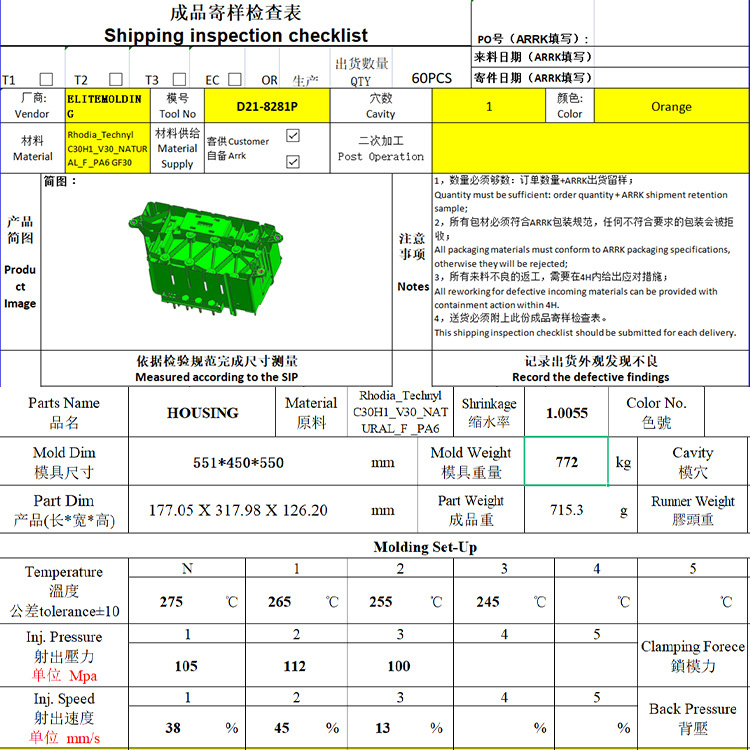plastic mold prototype making
plastic mold prototype making(FDM, FFF, SLS, SLA, 3D printing)
Fused deposition modeling (FDM) is a 3D printing process that uses a filament of thermoplastic material, which is melted and extruded layer by layer to create a 3D object. It is also sometimes known as fused filament fabrication (FFF). FDM technology is one of the most widely used 3D printing processes due to its affordability and the wide range of materials available for use. In FDM, a plastic filament is fed into an extrusion nozzle which is heated to melt the plastic. The nozzle is then moved in the X, Y and Z axes to create the desired shape. As the nozzle moves, the melted plastic is deposited onto a build platform, where it cools and solidifies. By repeating this process, layer upon layer of plastic is deposited until the 3D object is complete. The FDM process can be used to create complex parts that would be difficult to manufacture with traditional methods. The parts produced can also be used for a variety of applications, from prototyping to end-use production. FDM is also relatively fast compared to other 3D printing processes, making it ideal for quick turnaround times.

Fused deposition modeling (FDM) is a 3D printing process that uses plastic filaments to create 3D parts with fine details and accuracy. It is a type of additive manufacturing technology and is one of the most popular manufacturing processes used today. FDM is an economical and reliable method of producing prototypes, end-use parts, and manufacturing tools. Using this process, a 3D printer builds a part layer by layer by depositing melted plastic filament onto a build plate. The filament is heated and then extruded from the nozzle of the printer. The layers are stacked upon each other to create the desired 3D shape.
FDM is a great choice for prototyping and producing parts and tools for various applications. It is widely used in many industries, such as aerospace, automotive, consumer goods, and medical devices. The process is cost-effective, fast, and produces parts with good dimensional accuracy. The materials used for FDM are thermoplastics, such as ABS, polycarbonate, and nylon. The materials are available in a variety of colors and offer excellent mechanical properties.
Fused deposition modeling can also be combined with other additive manufacturing processes such as selective laser sintering (SLS) and stereo lithography (SLA). SLS is a powder-based 3D printing process that uses a laser to fuse the material together. SLA is a liquid-based 3D printing process that uses a laser to cure a photopolymer resin. By combining these processes, more complex parts can be printed with intricate details and high precision.
plastic mold prototype making advantage
Plastic mold prototype making is an important part of the product development process. It is a cost-effective way to validate the design and performance of a product before investing in expensive custom molds and tooling. There are many advantages to using plastic mold prototyping, including:
1. Cost savings: Because the prototype is created using an existing mold or 3D-printed mold, the cost of manufacturing the prototype is significantly lower than the cost of a custom mold. This provides an excellent opportunity to test a design before investing in a custom mold.
2. Faster production time: Compared to traditional manufacturing methods, plastic mold prototyping can produce parts quickly and accurately. This allows for faster product testing and feedback, which can help reduce the time to market.
3. Improved design: A prototype can be used to test the design of a product before investing in expensive custom molds and tooling. This allows designers to make changes and refinements to the product before investing in costly molds.
4. Versatility: Plastic mold prototyping is a great way to create new products or modify existing ones. It can also be used to create parts and prototypes for a variety of applications, including medical, automotive, and consumer goods.
Overall, plastic mold prototyping is an excellent way to test and refine products before investing in costly custom molds and tooling. It is a cost-effective solution that can provide a fast turnaround time, improved design, and versatility for a variety of applications.

plastic mold prototype making Precautions
1. Choose the right material: It is important to choose the right material for plastic mold prototype making. Different types of plastic have different properties, and selecting the right material for the prototype is essential for the success of the project.
2. Understand the process: Understanding the plastic molding process is a must when creating a prototype. Knowing the details of the process, such as the types of materials used and the number of steps involved, will help ensure that the prototype is made with accuracy and precision.
3. Design the prototype: Designing the prototype is the first step of the plastic molding process. It’s important to ensure that the design is accurate and can be replicated in the final product.
4. Prepare the mold: Preparing the mold is an important step in the plastic molding process. It is essential to ensure that the mold is properly prepared, as this will ensure that the prototype can be replicated accurately.
5. Test the prototype: Before the prototype is produced in large quantities, it is important to test it to ensure that it is of high quality and can withstand the production process.
6. Monitor the process: Once the prototype is created and tested, it is important to monitor the plastic molding process to ensure that the product is made as expected. This will help ensure that the product will be of high quality.
7. Inspect the product: After the product is made, it is essential to inspect it for any defects. This will help ensure that the product meets the desired specifications.
8. Maintenance: Regular maintenance of the plastic mold is essential in order to ensure that the product remains of high quality. This includes cleaning the mold and checking for any wear and tear.
Our Certificates
By co-operating with Elite Mold, you have selected one of the most reliable ISO 9001 certified plastic mold manufacturer, Elite Mold as a plastic injection mold manufacturer specializing in plastic injection mold and supplying plastic injection molding services for plastic mold design, prototype makings, mold flow analysis, precise machining, OEM services, ODM services and so on, building custom plastic injection molding. We are committed to enhance the Process optimized and quality of service, shorten lead time and assist in lowering inventory, by providing new products every year to bring in continuous and higher profits for our clients. The ability to produce mold at the International standard, strong engineering and mold design capability, aggressive delivery, competitive pricing and business integrity continues to be the success factor of Elite Mold.






